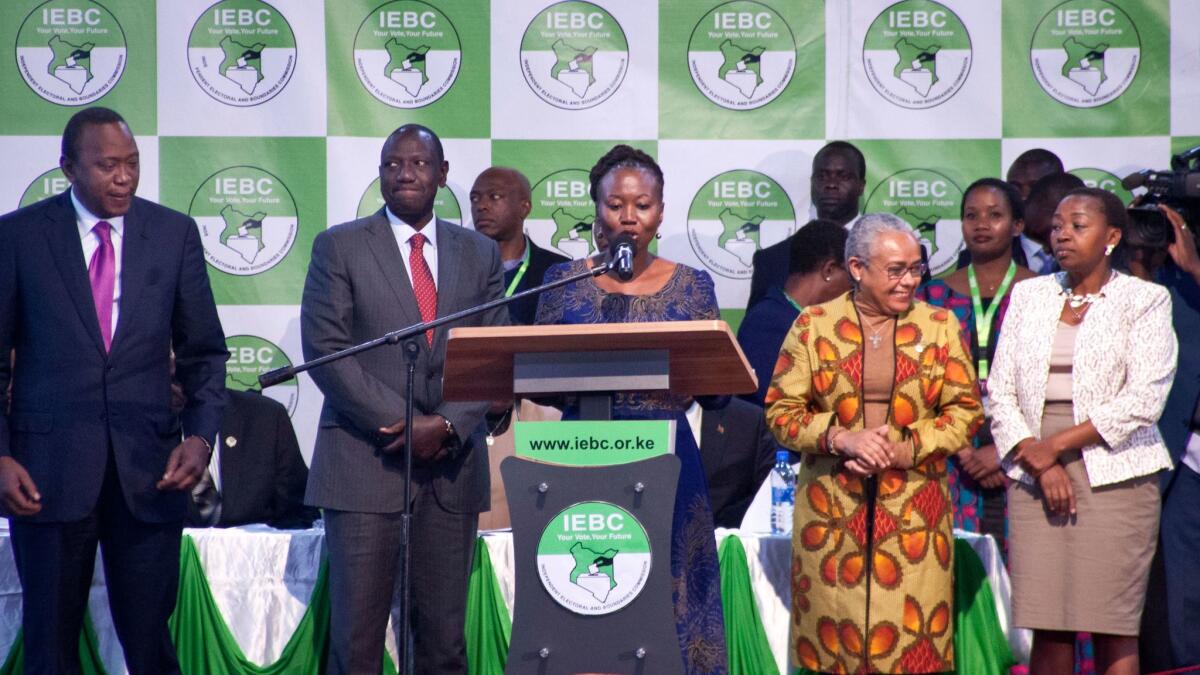Kenyan election official flees to U.S. in fear for her life, saying new election will not be fair

- Share via
Reporting from Johannesburg, South Africa — A repeat presidential election in Kenya due next week was plunged into crisis Wednesday when senior electoral officials spoke out against threats and interference from politicians, and a senior electoral commissioner fled to the U.S. citing death threats.
With a new election due in just over a week, after the Supreme Court nullified the Aug. 8 election, Kenyans learned that the Independent Electoral and Boundaries Commission has been facing anonymous threats and toxic political interference. The commission, divided along party lines, appears paralyzed.
The chief of the commission, Wafula Chebukati, warned political leaders to stop interfering in its work and threatening his staff.
“Ironically the very people, the political leaders who are supposed to build the nation have become the greatest threat to the peace and stability of the country,” he said. “I’ll not tolerate the threats on my staff anymore. I’ll not tolerate the interference in the commission anymore.”
Commissioner Roselyn Akombe resigned and fled to the United States, saying that the commissioners were partisan and that the commission could not deliver a credible election. She said staff and commissioners faced political intimidation and lived in fear they would be killed.
Her comments were reinforced by Chebukati, who said commissioners had repeatedly voted down his reforms along political lines in recent weeks. Staff members who were implicated in failures during the nullified Aug. 8 election had refused to step down, he said.
The crisis comes after the Supreme Court voided the Aug. 8 election because it did not meet standards set down in the constitution and electoral law.
The election has been marred by violence and intimidation: the killing of an election official in charge of data and transmission just days before the poll; the arrests and deportation of four foreign advisors hired by the opposition to ensure a transparent and fair election; and the killings of at least 67 people — mainly protesters — by police since the poll, according to Amnesty International and Human Rights Watch.
After the Supreme Court decision, President Uhuru Kenyatta called the judges “crooks,” accused them of stealing the election and vowed to “fix” them.
Kenyatta and his deputy, William Ruto, were charged with crimes against humanity by the International Criminal Court in relation to violence after the disputed 2007 election. But prosecutors complained that Kenyan authorities blocked access to documents and refused to cooperate. Witnesses were intimidated and many withdrew their testimony, forcing the ICC to drop both cases.
Kenya has seen opposition protests across the country in recent weeks calling for the removal of commission staff members whom they accuse of failures in the Aug. 8 poll.
Opposition leader Raila Odinga last week withdrew from the repeat election, saying the conditions for a free and fair election did not exist.
“All indications are that the election scheduled for Oct. 26 will be worse than the previous one,” he said.
Chebukati and Akombe portrayed an electoral commission in chaos, poisoned by political interference and paralyzed by partisanship.
Akombe said in a statement that the commission was “under siege” and would not deliver a credible election, “not when commissioners and staff are intimidated by political actors and protesters and fear for their lives. Not when senior secretariat staff and commissioners are serving partisan political interests.”
She said she faced anonymous death threats and pressure to resign, and said she did not believe it would be safe to return to Kenya in the near future. She made the comments to the BBC, adding that you would have to “be suicidal to think nothing will happen to you.”
Election official Chris Msando was abducted, tortured and killed in July in what many believe was an effort to interfere in the August election.
Chebukati said until compromised staff members stood down, the Oct. 26 poll would not be credible.
“I have made several attempts to make critical changes, but all my motions have been defeated by a majority of the commissioners. Under such conditions it’s difficult to guarantee free, fair and credible elections.
“Without critical changes in key secretariat staff, free, fair and credible elections would surely be compromised. I therefore call on the staff who have been adversely mentioned to step aside to allow this project team to function without interference.”
Chebukati and Akombe said legal advice put forward by commissioners was skewed to suit political interests.
Chebukati called on politicians from both sides to meet and forge an agreement to restore respect for democratic institutions, enabling the commission to do its work. Without such an agreement, he warned the country risks a return to the ethnic violence that followed the 2007 election when about 1,500 people were killed.
“Once the Kenyan people see that their leaders are talking and putting Kenya first, then we can douse the tension in the air. Politics should not make people enemies,” Chebukati said
If violence erupts again, the people to suffer would be ordinary Kenyans, not their political leaders, he said.
“Peace is what we get when we embrace true democracy. If Kenya burns, it will be because we have not addressed these issues and because we have created a society where some are more equal than others.”
Despite the concerns about another tainted election, Kenyatta has signaled his determination to go ahead with it and has ruled out political talks with Odinga and the opposition.
On Wednesday, he declared Sunday a day of prayer for Kenya.
Twitter: @RobynDixon_LAT
More to Read
Sign up for Essential California
The most important California stories and recommendations in your inbox every morning.
You may occasionally receive promotional content from the Los Angeles Times.










